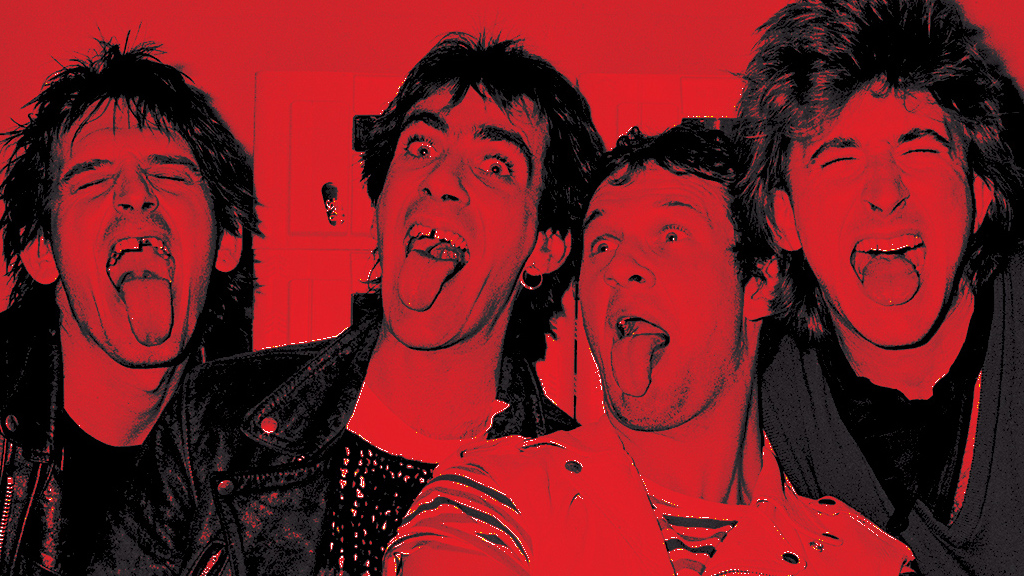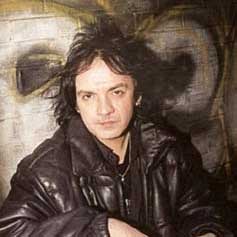This particular autumn evening in 1984 has long darkened into deepest night, and the mood in Keith Richards’s suite at London’s plush Savoy Hotel is humorously mellow. Apart from the supremely chilled Rolling Stone, there are only two other people in the room: this writer and Alan Clayton, the Shepherd’s Bush singer/guitarist who, after hitting it off with Richards three years earlier, has been a regular visitor during the current internal conflict between Richards and Mick Jagger.
Perched on an antique couch, bottle of Jack Daniel’s in hand, Richards has hoisted up a big acoustic guitar and been gouging potent blues favourites, and even a spellbinding burst of Wild Horses. “Now it’s your turn,” he declares, handing the guitar to Clayton, who responds with a heartfelt rendition of his own The Gamblers Song. It earns howls of appreciation from Richards, who will even be reported in the press as having joined Clayton’s band the Dirty Strangers. Instead the Stone plays an active role getting the Dirty Strangers’ first album recorded and released, and becomes Clayton’s friend, collaborator, confidante, press champion and even employer over the next 32 years. “We’re the same, you and me, except you didn’t get the breaks,” Richards said to Clayton one night.
Now in his early 60s, Clayton has stuck to the simple but passionate rock’n’roll mission that started with the Dirty Strangers becoming terrors of London’s grass-roots gig circuit during the 1980s, cutting through shiny trends with their unpretentious celebration of rock’n’roll, as minted by Eddie Cochran and Gene Vincent then continued through the Stones. Since then, Clayton has never stopped striving, ducking and diving. And now he has a sizzling new noir concept work, Crime And A Woman.
Over the years this Jack-the-lad-style dynamo has found himself recording at Richards’s Redlands home, travelling the world as part of the Stones’ inner circle, recording with legendary MC5 guru and beat poet John Sinclair, playing with late sax titan Bobby Keys at his last ever club show, and hosting the Dissenters’ Gallery series of events that saw former Clash members Mick Jones and Topper Headon reunited on stage for the first time in years. For the last two years, Clayton has also sung with the Brian James Gang, the original Damned guitarist being an old friend: “One of my favourite rock’n’roll players, a great guitarist.”
While the Keith Richards connection has been a major element in his life, Clayton’s own story has followed a fascinating trajectory, which always returns to the Dirty Strangers and his beloved West London. After his parents split when he was an infant, he grew up at his grandmother’s council house on the notorious Stonebridge Park estate. After attending school in Southall, he says he was “a proper hooligan, who got into doing security”. This could involve clearing out brothels, debt collecting and anything from working the Rolling Stones’ 1976 stint at Earls Court to Bob Marley’s 1980 show at Crystal Palace. At the latter, Clayton found himself sitting next to the late reggae icon in the backstage area, sharing “the biggest joint I have ever seen” after deflecting some unwanted backstage visitors. After Clayton’s wife Jackie became pregnant with their son Barrie around 1978, he bought the terraced house in Shepherd’s Bush that they still live in today.
Clayton was still working security when he started putting together the band named after a line in Sonny Terry and Brownie McGhee’s Stranger Blues. He clicked with fellow bouncer ‘Big’ Joe Seabrook, who loved the Dirty Strangers and thought his current boss, Keith Richards, would too. “Big Joe looked after me. He believed Keith would like the band and also that the two of us would get on,” Clayton says.
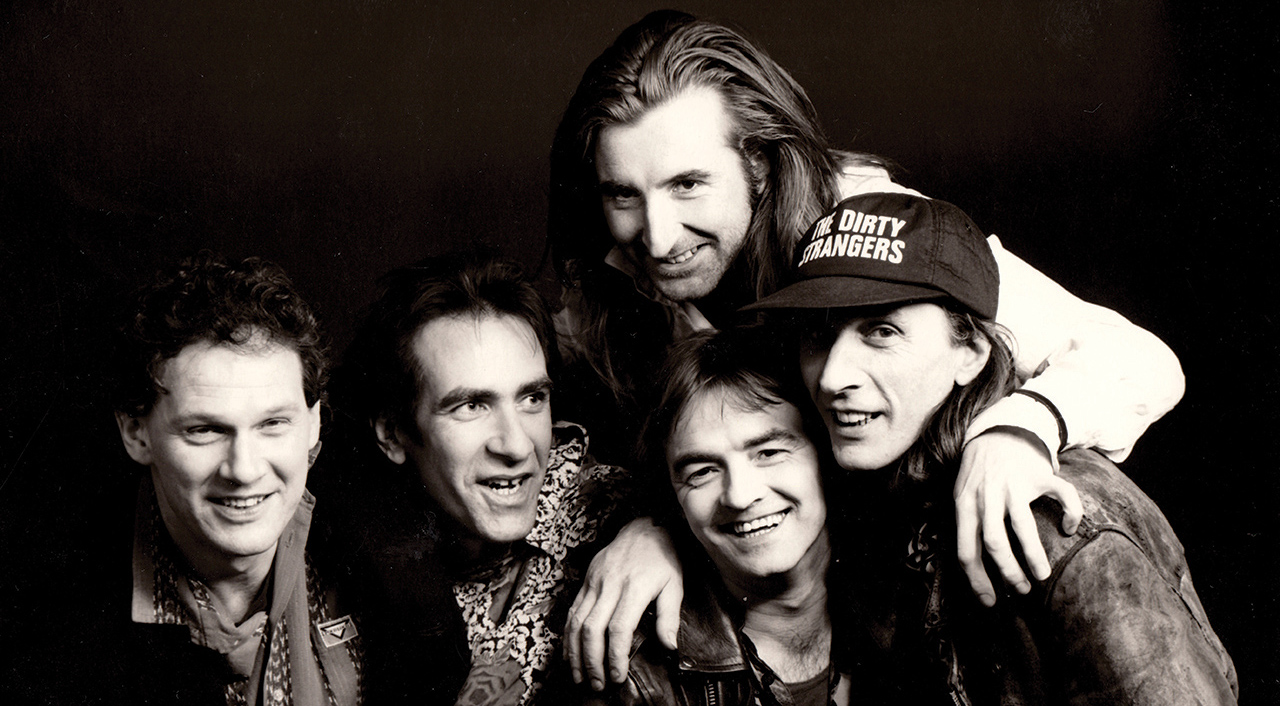
Big Joe was spot on. “There were so many sessions at the Savoy!” he recalls. “I used to leave there in the morning and go straight to the building site where I was working. Sometimes I’d be there for days on end.”
The first time this writer encountered the Dirty Strangers – who then included former Ruts guitarist Paul Fox, keyboard player Scott Mulvey, bassist ‘Steady’ Ray King and drummer Mark Harrison – was when Richards mentioned them during our interview at the Savoy in 1983. “Right now they’re probably the only British band I know of,” he told me. “There was a weird parallel, because the first stuff they recorded was at IBC Studios, which is where [the Stones] cut our first stuff. I heard three or four songs that were really interesting. I managed to lay this tape on a DJ in Paris and it took off like that, but they didn’t have a record to back it up then. But on the strength of that they got over to Paris to do a couple of shows.”
When the Dirties were recording demos at the rudimentary F2 studios in north London, Richards turned up at the all-night session and ended up playing on six tracks, including future singles The Thrill Of The Thrill and Bathing Belles, plus Diamonds, Clayton’s homage to his beloved Otis Redding.
“When I played Keith the mixes a few days later he wanted to go back in the studio to redo them,” Clayton recalls. “I told him we had no money left. So he offered to pay to redo his guitar, and we went back to the studio with Keith footing the bill. He says he never picked up a guitar to make money, and just wanted to play. There’s lots of people who like music, but only a few people passionate about it like that. Keith acted just like one of the boys, just mucked in and got on with it. He knew all the changes and put everything into it. It was a buzz but it just felt perfectly normal. We came out at seven in the morning and I took him back to his hotel in my white builder’s van.”
- "I've had enough of politicians telling me what to do": Ruts DC are back
- Britpop? The Rolling Stones nailed that in 1964...
- Q&A: Ronnie Wood
- The top 10 best Mick Jagger Rolling Stones songs
Complete with three tracks Ronnie Wood had already played guitar on, the Dirties’ self-titled album was released in 1987 on the Thrill Records label started by Keith’s old friend Prince Stanislaus Klossowski de Rola. Son of renowned painter Balthus, the 60s dandy known as Stash occupied a major place in the Stones’ inner circle, getting busted with Brian Jones in 1967 then with Richards in 1973. When Keith brought him to the studio, he asked which label would be releasing the album. “When he found out we didn’t have a label, says Clayton, “he said: ‘That’s preposterous. I’ll start my own and put it out.’ He got it released around the world.”
Maybe in return for the Dirties playing at his wedding to Jo in 1985, Ronnie Wood allowed himself and his house to be used in the Thrill Of The Thrill video, and the Dirties toured the US using his amps and guitars. However, Virgin Records, who had signed Richards to a solo deal, insisted the album be withdrawn in the US because his name was emblazoned on the cover.
Undeterred, the Dirties released 1993’s Burn The Bubble, on which Richards co-wrote Saturday Night. After the album was ignored by a Britpop-obsessed UK, the Dirties “sort of disintegrated”, although Clayton continued playing filthy rock’n’roll with the short-lived Jack The Lad, which mutated into Monkey Seed. While his younger son Paul came on board as a gig DJ and computer-savvy “full-time motivator”, Clayton continued hanging out with Richards, and still remembers the day in 2000 when, after playing at the Croydon Greyhound, he drove to Redlands clutching his latest demos.
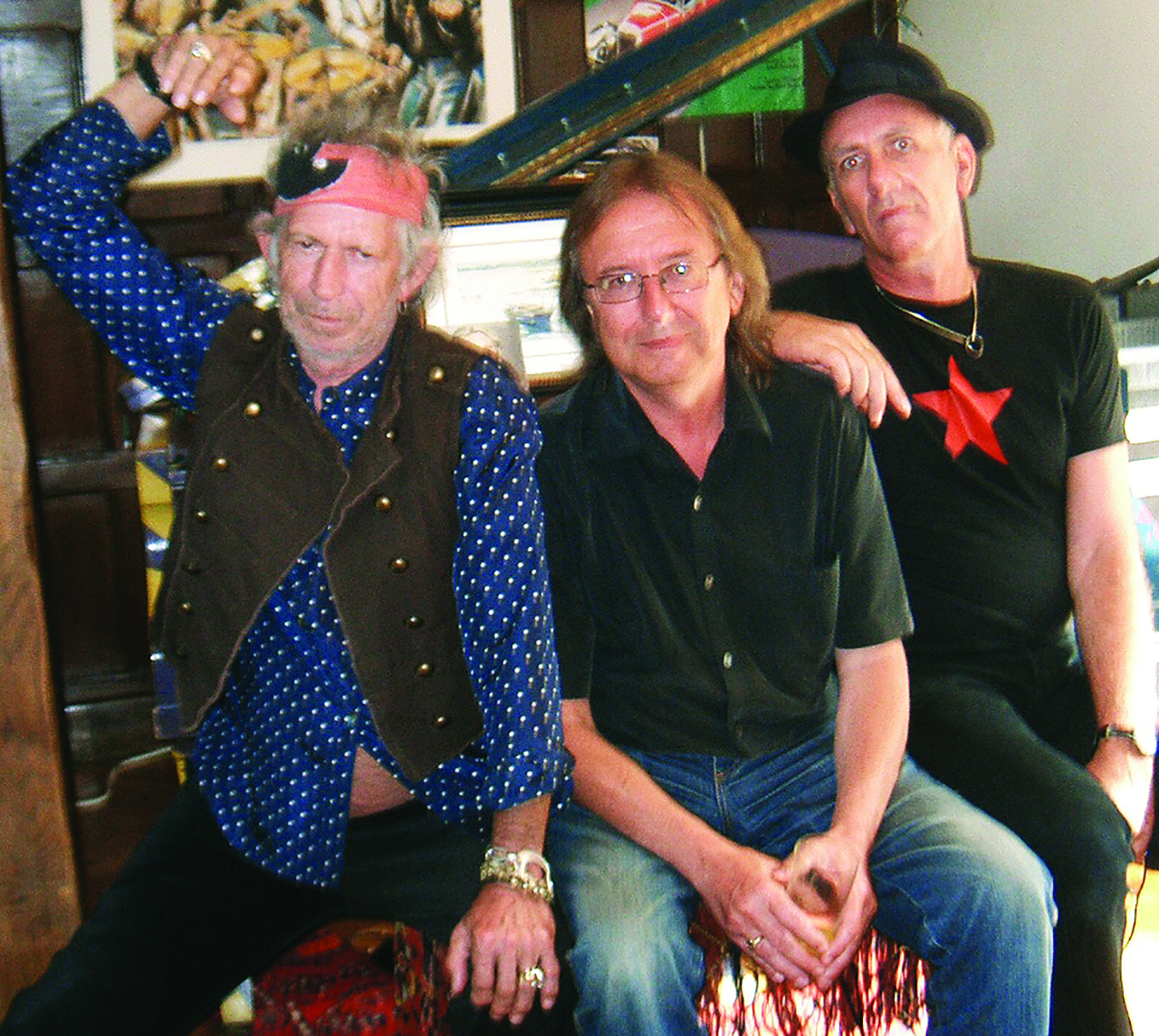
“I had my two Telecasters with me, so I left them in the hallway. It was a good night, and Keith really liked the demos. Next morning, as we were leaving, I picked up my two guitars. Keith handed me this 1964 Gibson Hummingbird acoustic. ‘You left one,’ he said. ‘That’s not mine,’ I said. ‘It is now. It’s yours.’”
Not just a Hummingbird, it turned out to be the one Richards had played at key Stones sessions, including the One Plus One movie and Exile On Main St. “There’s a lot of spirits in that guitar,” says Clayton. “I didn’t know the history of it, but [guitar technician] Alan Rogan, who’d looked after it for Keith when he was doing the Stones, confirmed it. Then Keith gave it to me. I didn’t own an acoustic guitar – and it’s not like he gave me a bit of junk!”
When the Stones celebrated their 40th anniversary with 2002’s Licks tour, Richards took Clayton on the road “as his mate, to sit next to him on the plane and stuff like that”. Next, while at Redlands, helping Richards write tracks for 2005’s A Bigger Bang, Clayton jokingly asked if he could go on the upcoming tour, and ended up on the road with the Stones for over two years. “Keith said sure, but this time I would have to work.”
His duties included line-checking Jagger’s microphone at some of the biggest gigs in the world, including one at Rio’s Copacabana beach, which attracted more than a million punters. Didn’t this sometimes seem surreal?
“I’ve always been in situations in my life that have been a bit surreal,” says Clayton. “Sometimes it was like being an extra in a film, but right in the middle of being the main part. The secret is not trying to be the main part. I never took it for granted. When I was on stage at Madison Square Garden, I rang my dad from the stage and said: ‘Guess where I am?’ Because he knew Frank Sinatra had sung there.”
On returning from the tour, Clayton reunited the Dirty Strangers and recorded 2009’s West 12 To Wittering: Another West Side Story with bassist John Proctor and drummer George Butler, a Notting Hill counterculture veteran who had played with the Lightning Raiders. The album’s title was inspired by Clayton’s eternal stomping ground and home studio location, while homaging Richards, who recorded piano on five tracks at Redlands and co-wrote unrepentant rockers Bad Girls and She’s A Real Botticelli.
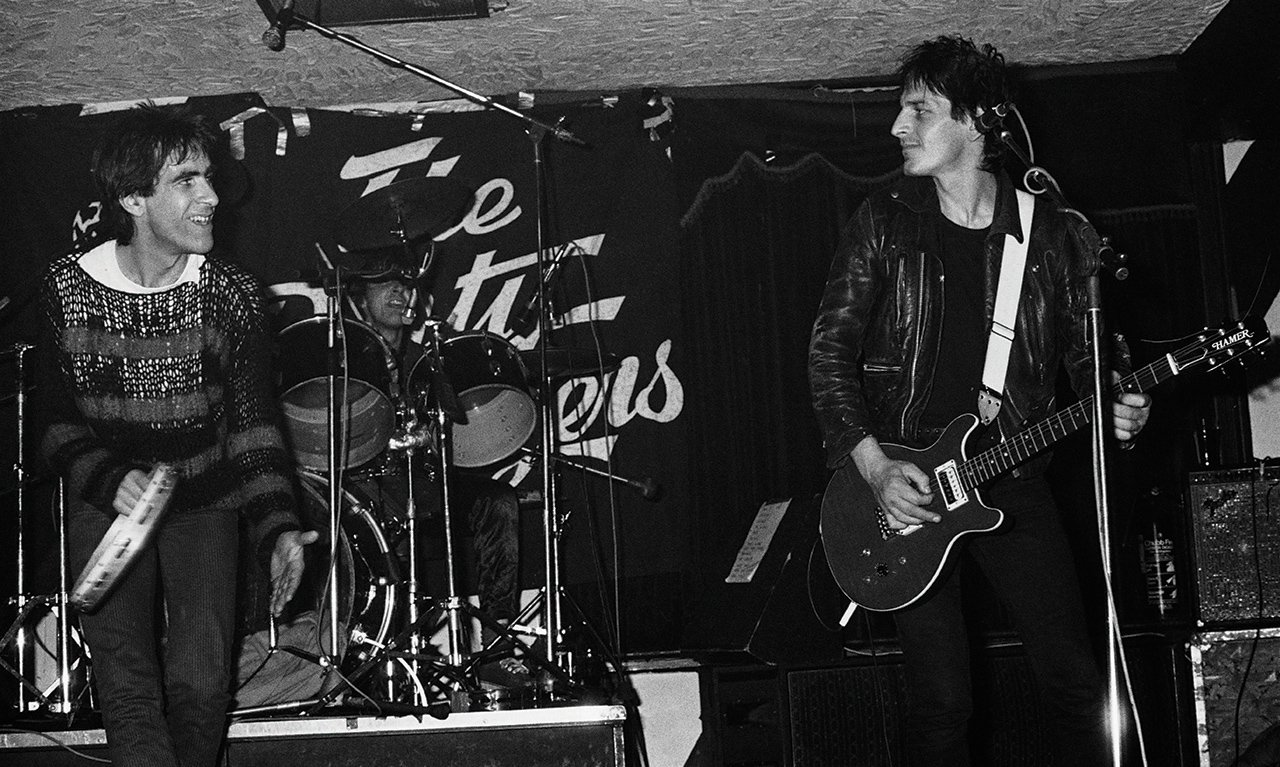
The album was mostly produced by veteran Brit-rocker Joe Brown’s son Pete, whose dad played banjo on All Away. Brian James, one of Clayton’s closest friends for more than 30 years, produced two tracks at his Brighton studio.
Arriving like an exhilarating blast of West London rock’n’roll air, the album was released on the rejuvenated Track Records, then under the auspices of Dirties manager Ian Grant.
The Dirty Strangers joined the Dissenters Gallery events organised by the Rotten Hill Gang at the Inn On The Green on Portobello Road in 2010, with Clayton MC-ing those weekly celebrations of the “West London vibe”. The RHG then included Mick Jones, whom Clayton had known as a student at Hammersmith College Of Art And Building while he was working there as a technician.
When the Stones were in London for their 2013 Hyde Park appearance, Clayton booked a Dirties show at the Borderline. He already knew Stones sideman Bobby Keys, who accepted his invitation to play at their gig. The sax legend was only going to play the encores but “halfway through the set he was on stage, starting with Gene Vincent’s Baby Blue, then some Little Richard songs and Diamonds. He was unbelievable – he played like he’d been in the band all his life, and enjoyed it so much.”
Keys agreed to accompany the Dirties on a European tour for half his fee, but “unfortunately his health went down. We lost a great mate, but were so honoured to have played with him. Keith loved it that Bobby played with us.”
When it was time for the Dirties to record a new album, John Proctor (“the Bill Wyman of the band”) appeared, clutching 12 songs that Clayton had written but never recorded. These were then shaped into the new album.
“When I played the songs to my son Paul, he said: ‘How come all your songs are about either crime or women?’ I liked that so much I made it the title and started looking at it as a concept album; I don’t like that term, but even Frank Sinatra made concept albums. It follows the main character through a short period in his life. He’s been mixed up in a lot of crime but decides to change his life after he meets a girl. He’s just got one last thing to sort out, but it goes disastrously wrong and he’s left with fuck all.”
Setting Son, the intimately poignant closing track, recorded by Clayton and Scott Mulvey at the BBC’s Maida Vale Studios, is about Clayton’s late son Barrie, who passed away in 2001. “That was a hard one to write. It’s been fifteen years now.” Cold Night is a spooky organ ballad, and Short & Sweet was written “for Otis Redding – there ain’t nothing better than an Otis ballad”. Meanwhile, the rockers are triumphant rampages, including the razor-edged strut of Danger First, the Gene Vincent-homaging You’ve Gotta Shake and the anthemic South Of The River. “It’s the first album I’ve ever done that Keith’s had nothing to do with!” says Clayton. “Before this he’d played on everything I’ve ever done.”
This is mainly because, right now, Richards has his own album to do (Clayton has heard some of it, including the blues set that may come out at the same time, but with understandable discretion he will say only that “it sounds great”).
Looking back, while proving he can stand on his feet perfectly well without his superstar buddy, Clayton has much to smile about from “that rock’n’roll path I’ve always been on. Keith’s always been the same in the thirty-five years I’ve known him. We get on, and we get off on one another. He loves my ‘youthful’ enthusiasm. There’s obviously a reason we’ve hung out together so long.”
And many more reasons to check out this irrepressible London guy’s single-minded mission to get into the heart of rock’n’roll.
